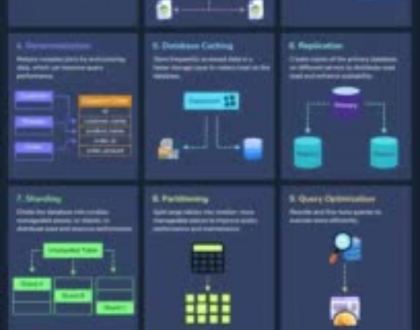A Comprehensive Guide to ECommerce Web Development in US

A comprehensive guide to eCommerce web development in the US would cover various topics such as website design and layout, payment gateway integration, shipping and tax calculations, inventory management, and security measures to protect customer data. Additionally, it may also cover aspects of digital marketing and SEO, as well as best practices for creating a user-friendly and effective eCommerce website.
ECommerce development : eCommerce development refers to the process of creating and maintaining an online store or marketplace for the purpose of selling products or services over the internet. This can include website design and layout, payment gateway integration, shipping and tax calculations, inventory management, and security measures to protect customer data. eCommerce development also involves ensuring the website is optimized for search engines and user experience, as well as digital marketing efforts to drive traffic and sales.
Website design : Website design refers to the process of creating the visual and interactive elements of a website. This includes the layout, color scheme, typography, and overall aesthetics of the site. It also encompasses the user experience design, which involves making the website easy to navigate and use. Website design is an important aspect of eCommerce development, as it can have a significant impact on the user’s perception of a business and ultimately their willingness to make a purchase. A well-designed website should be visually appealing, easy to navigate, and optimized for conversions.
Payment gateway integration : Payment gateway integration is the process of connecting an eCommerce website to a payment gateway service, which allows customers to securely make payments for products or services. A payment gateway acts as an intermediary between the website and the customer’s bank, handling the transmission of sensitive payment information. This integration enables eCommerce website to accept credit card, debit card, and other forms of online payments. Payment gateway integration is a crucial aspect of eCommerce development as it enables the website to process transactions and complete sales.
Shipping and tax calculations : Shipping and tax calculations refer to the process of determining the cost of shipping a product to the customer and calculating any applicable sales taxes. This information is typically based on the customer’s location, the weight and dimensions of the product, and the shipping method chosen by the customer. In eCommerce development, shipping and tax calculations are typically handled by a software or plugin that can automatically calculate these costs based on the information provided during the checkout process. This is important as it ensures that the customer is aware of the total cost of their purchase, including shipping and taxes, before they complete the transaction.
Inventory management : Inventory management refers to the process of keeping track of a business’s stock levels, sales, and restocking. This includes keeping track of how much of a product is on hand, how much has been sold, and when to reorder. Inventory management is an essential aspect of eCommerce development, as it ensures that the website always has the products in stock to fulfill customer orders and that it can avoid overstocking or stock outs. There are several inventory management systems are available which can be integrated to the eCommerce website to automate this process like stock tracking, reorder management and tracking of sales, etc.
Data security : Data security refers to the protection of sensitive information, such as customer personal and financial information, from unauthorized access or breaches. In eCommerce development, data security is critical as it ensures that customer information is protected during the transaction process, and that the business is in compliance with regulations such as the Payment Card Industry Data Security Standard (PCI DSS). This can include measures such as encrypting sensitive information, implementing secure login protocols, and regularly monitoring for potential breaches. Additionally, data security also involves maintaining compliance with data protection regulations such as General Data Protection Regulation (GDPR) and California Consumer Privacy Act (CCPA)
Digital marketing : Digital marketing refers to the promotion of products or services through digital channels such as search engines, social media, email, and websites. It is an essential aspect of eCommerce development as it helps drive traffic to the website and increase sales. Digital marketing can include various tactics such as search engine optimization (SEO), pay-per-click advertising (PPC), social media marketing, content marketing, email marketing, and affiliate marketing. Digital marketing campaigns can be used to target specific audiences and track the effectiveness of the campaign. It also includes analyzing the data and making necessary changes in the campaign strategy to achieve the desired results.
SEO : Search engine optimization (SEO) is the practice of optimizing a website to improve its visibility and ranking in search engine results pages (SERPs). This is accomplished by making changes to the website’s design, content, and technical elements to make it more attractive to search engines. SEO is an important aspect of eCommerce development as it helps drive organic traffic to the website and increase visibility for potential customers. SEO includes several techniques and best practices to improve website’s ranking such as keyword research, on-page optimization, link building, and technical SEO. It is an ongoing process that requires regular monitoring and updates to maintain and improve the website’s search engine ranking.
User-friendly design : User-friendly design refers to the practice of designing products, interfaces, and systems that are easy to understand and use by people with a wide range of abilities and backgrounds. This type of design often prioritizes usability, accessibility, and simplicity, and aims to make the user experience as seamless and enjoyable as possible. User-friendly design can be applied to a wide range of products and services, including software, websites, appliances, and more.
ECommerce website best practices : ECommerce website best practices refer to a set of guidelines and principles that are considered essential for creating an effective and user-friendly eCommerce website. These best practices can include:
- Clear and easy-to-use navigation
- High-quality product images and descriptions
- Secure payment and checkout processes
- Fast and responsive page loading
- Mobile optimization
- Clear return and refund policies
- Providing customer reviews
- Providing Live chat support
- Personalized recommendations
- Optimizing for Search Engine Optimization (SEO)
Adhering to these best practices can help ensure that your eCommerce website is effective in converting visitors into customers and providing an enjoyable user experience.
US market : The US market refers to the economic and commercial activity within the United States. It includes the buying and selling of goods and services, as well as the production and distribution of these goods and services. The US market is one of the largest and most developed markets in the world, with a diverse and highly competitive economy. It is often considered a bellwether for the global economy, with many businesses and investors looking to the US market as a key indicator of economic health and stability. It is made of a variety of industries such as technology, finance, healthcare, retail, manufacturing, and many more.
A comprehensive guide to eCommerce web development in the US would cover a wide range of topics related to building and operating an eCommerce website in the United States. This guide would likely include information on user-friendly design principles, eCommerce website best practices, and the unique characteristics of the US market. It would also provide detailed guidance on how to create an effective and user-friendly eCommerce website, including tips and best practices for navigation, product images and descriptions, payment and checkout processes, mobile optimization, and search engine optimization (SEO). Additionally, it would also provide information on legal and compliance requirements specific to the US market. Overall, a comprehensive guide to eCommerce web development in the US would be an invaluable resource for businesses and entrepreneurs looking to enter the eCommerce market in the United States.
Recommended Posts

12 Proven Ways to Improve Database Performance
April 29, 2025


